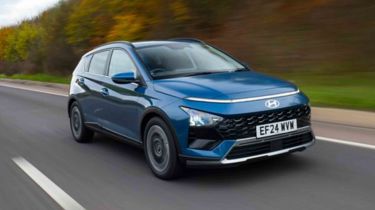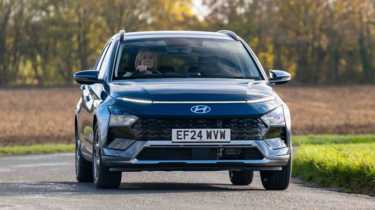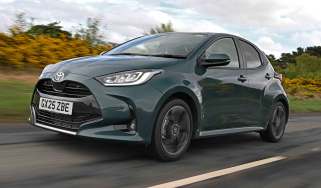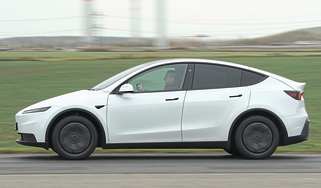Hyundai Bayon review
The Hyundai Bayon is a fine small SUV, with striking looks and some impressive onboard tech

Our opinion on the Hyundai Bayon
The Hyundai Bayon offers a no-nonsense, practical, and well equipped package, although it doesn’t stand out when it comes to the driving experience or its interior. It gets enough of the small things right, and we reckon it’s on target for the kind of buyers it’s aimed at, but despite its affordable pricing, we think there are better rivals out there.
| Key specs | |
| Fuel type | Petrol |
| Body style | Small SUV |
| Powertrain | 1.0 litre, 3cyl petrol, front-wheel drive |
| Safety | 4 stars (Euro NCAP, 2021) |
| Warranty | 5 years/100,000 miles |
About the Hyundai Bayon
To help the Bayon stand out against the brand’s other models, Hyundai has given its smallest SUV an unusual exterior design. You’d be forgiven for thinking those looks would be hiding some trick hardware, but in actual fact, the Bayon’s underpinnings are rather ordinary - it’s based on the same set of parts as the Hyundai i20 supermini.
The slim lights, split grille and angular bodywork at the front give it a unique face, while the rear end features a zig-zag look with inward-pointing tail-lights and only a small section of painted bodywork on the boot door. It does help to give the Bayon a unique look, although the latest and considerably larger Hyundai Kona sports its own distinctive styling, which is more in line with the manufacturer’s biggest SUV, the all-electric Hyundai Ioniq 9.
While the Kona has a range of petrol, hybrid and even electric versions, the Bayon is offered with just one engine, a 1.0-litre three-cylinder petrol producing 99bhp and 172Nm of torque. There used to be a more potent 118bhp version, but that disappeared from the order books during the Bayon’s facelift, as did its 48V mild-hybrid assistance that improved efficiency and gave a small boost while accelerating. The Bayon is still available with a six-speed manual or a seven-speed dual-clutch automatic gearbox, though.
Used - available now

2023 Hyundai
Bayon
4,098 milesAutomaticPetrol1.0L
Cash £12,949
2023 Hyundai
Bayon
32,317 milesManualPetrol1.0L
Cash £11,697
2023 Hyundai
Bayon
5,010 milesManualPetrol1.0L
Cash £14,300
2023 Hyundai
Bayon
41,392 milesManualPetrol1.0L
Cash £11,197The trim range has also been revamped during the facelift to better align with its siblings. It starts with the Advance, which comes with 16-inch wheels, auto high beams, cruise control, rear parking sensors, a 10.25-inch digital screen behind the wheel, and an eight-inch central touchscreen display with smartphone connectivity.
Mid-range Premium is next and adds 17-inch wheels, rear privacy glass, climate control, auto lights and wipers, and front parking sensors, plus heated front seats and steering wheel. Among the additional features on top-spec Ultimate trim are a Bose stereo and more stylish interior trim, but it’s probably not worth the extra.
Prices start at just over £23,000 for the entry-level Advance, rising to around £24,500 for our preferred mid-range Premium trim. You’ll need to splash out just under £26,000 for the top-of-the-range Ultimate, which is still less than the entry-level Ford Puma. Adding a seven-speed automatic gearbox to any version of the Bayon will cost £1,250.
If you're interested in getting yourself a Hyundai Bayon, we can help. Configure your ideal Hyundai Bayon now to get top offers from local dealers, check out the latest Hyundai Bayon leasing deals or search for used Hyundai Bayon models with our Find A Car service. You can even sell your existing car for a great price with Auto Express Sell My Car.
Performance & driving experience
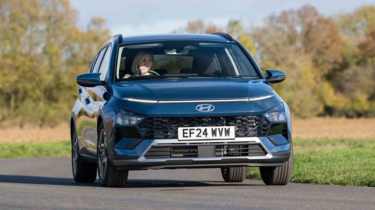
| Pros |
|
| Cons |
|
The Hyundai Bayon is typical of the supermini-SUV segment: easy to park and slot into gaps in town, but not exactly fun to drive outside the city limits. The Ford Puma bucks this trend because it’s more fun than other cars of its type.
This Hyundai is more focused on comfort, which it manages pretty well. However, the manual version is quite unsatisfying to drive, so we’d suggest either going for the automatic model, or having a look at our favourite small SUV, the Dacia Duster. You could also consider the Korean brand’s own Kona, which (like the Dacia) is more satisfying to drive.
Performance, 0-60mph acceleration and top speed
The 1.0-litre engine offers up 99bhp and 172Nm of torque, which is on par with the entry-level Volkswagen T-Cross, but is hardly earth-shattering for the class.
The engine is quiet and unobtrusive for the most part, delivering a 0-62mph time of 11.3 seconds for the six-speed manual version and 12.4 seconds for the seven-speed automatic. That’s a similar level of performance to the entry-level T-Cross, but both the Dacia Duster and entry-level manual version of the Ford Puma can crack the same 0-62mph dash in around 10 seconds.
Town driving, visibility and parking
The steering, gearbox and pedals are all very light and don’t offer much feel or feedback. Chunky door mirrors aid visibility when pulling out into traffic, while standard rear parking sensors and a reversing camera make it a little easier to slot the Bayon into a bay in a multi-storey car park.
We don’t have any particular issue with the action of the manual gearbox. It uses Hyundai’s clutch-by-wire set-up, which means the clutch pedal isn’t mechanically connected to the gearbox. This has benefits for efficiency and smoothness, and most won’t notice the difference, but if you’re a keen driver, the disconnected feeling might remove some appeal.
What’s more irritating with the manual is that first gear is short, to help get you off the line more quickly, but then second gear is really long to help keep the revs down to improve fuel economy and emissions. Unfortunately, when you change up, this causes the engine to bog down out of its power band, which is especially noticeable now, because the Bayon no longer has a mild-hybrid system to provide a boost of power at low revs, making it very hard to drive the car smoothly. Rivals like the Ford Puma, which feature a mild-hybrid system, are much easier to drive smoothly at low speeds.
B-road driving and handling
On twistier roads, the Bayon feels reasonably agile. Thanks to a decent amount of grip, you can confidently carry some speed into corners, and the body doesn’t lean over too much, helping it to feel safe and stable. The steering, although light and lacking feedback, is precise enough at higher speeds. You can switch to Sport mode using a button on the centre console, but this adds artificial weight and doesn’t change much about the driving experience, which is a bit dull in general. At least the Bayon rides smoothly enough over rougher sections of Tarmac.
If we were to level one minor criticism, it’s that the driving position feels barely any higher than the i20 supermini’s, so you don’t really benefit from the more lofty SUV-inspired driving position that some people like.
Motorway driving and long-distance comfort
Once you’re up to speed, the engine quietens down and is absorbed into the general background hum from the tyres, while wind noise is reasonably well contained. Despite being a small SUV, you can tackle a relatively long motorway journey without feeling tired.
It’s a little disappointing that you have to add the £800 Driver Convenience Pack to an automatic-equipped car in Premium trim, or go for the top-of-the-range Ultimate spec, to get a blind-spot warning system. This helps warn you of vehicles alongside when changing lanes, and is standard on every version of the rival Volkswagen T-Cross.
The T-Cross also comes with adaptive cruise control as standard, a system that some like on motorway journeys because it maintains a safe distance to the vehicle in front by matching its speed. If you want the same on a Bayon, you again need to add the Driver Convenience pack to either a Premium or Ultimate-trim Bayon equipped with an automatic gearbox.
“I shared a manual Bayon with a colleague, and no matter what we tried, we couldn’t go from first to second gear without causing our passengers’ heads to nod, making us feel like novices behind the wheel.” - Max Adams, Online reviews editor, who drove a Hyundai Bayon Ultimate over a week-long loan.
| Model | Power | 0-60mph | Top speed |
| 1.0T Advance | 99bhp | 11.3s | 111mph |
| 1.0T Advance DCT | 99bhp | 12.4s | 109mph |
MPG & running costs
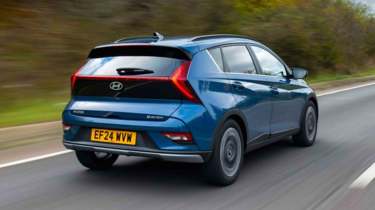
| Pros |
|
| Cons |
|
The Hyundai Bayon uses a 1.0-litre petrol unit with 99bhp that previously had a mild-hybrid system to boost performance and fuel efficiency, but that’s been removed as part of the facelift. Due to the omission, fuel economy and emissions are slightly worse, at 51.4mpg for both the manual and automatic models, while emissions are 125g/km for the manual, and 124g/km for the automatic. That’s down from the 53.3mpg and 119g/km compared with the pre-facelift Bayon.
In a mixture of motorway and A and B-road driving, we saw 43.5mpg from a manual Bayon. That’s not too bad, but we’ve seen over 50mpg from a hybrid-equipped Dacia Duster that’s available for similar money to the Bayon.
| Model | MPG | CO2 | Insurance group |
| 1.0T Advance | 51.4mpg | 125g/km | 16E |
| 1.0T Advance DCT | 51.4mpg | 124g/km | 15E |
Insurance groups
The entry-level automatic Bayons sit in group 15 for insurance, so while they’re not ultra-cheap considering it’s a 1.0-litre engine with less than 100bhp, costs shouldn’t be too bad. The manual-gearbox car is actually in group 16, but that won’t affect premiums too much.
For those looking to save significantly on their car insurance, consider the entry-level Ford Puma, which starts in group 12, or the SEAT Arona, which falls into group 10.
Tax
Every Bayon will be charged the standard rate of annual vehicle excise duty (VED) road tax, and due to its affordable pricing, the Bayon avoids the expensive car or luxury car tax surcharge applied to cars that cost more than £40,000 when new.
Depreciation
Residual values for the Bayon are okay according to our expert data, which suggests that it should hold onto around 45 per cent of its original value after a typical three-year/36,000-mile ownership period. The Ford Puma fares better at between 49 and 55 per cent of retained value over the same three-year period, but it can’t match the Dacia Duster, which is expected to maintain between 58 and 66 per cent.
To get an accurate valuation for a specific model, check out our free car valuation tool...
Interior, design & technology
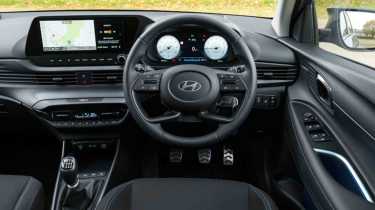
| Pros |
|
| Cons |
|
Hyundai already sells one small SUV - the Kona - so the Bayon had to offer something completely different, and it does this with its smart, but slightly quirky styling. This means it rivals the more style-focused models in the small SUV class, such as the Peugeot 2008. You can decide if you love or hate the look, but it certainly stands out.
Interior and dashboard design
The Bayon’s interior doesn’t follow the same path, because it’s quite plain and doesn't have the flair of the 2008, which is much more pleasant to sit in.
You do get a nice leather steering wheel in the Bayon, plus an excellent infotainment system in all versions. Every model also has a 10.15-inch “Digital Supervision Cluster” - Hyundai’s name for its digital instrument cluster. The latter is more interesting than a traditional set of dials, and the look of the readout alters depending on which drive mode you’re in. It isn’t as customisable as the fully digital cluster fitted to R-Line versions of the Volkswagen T-Cross, though.
Materials and build quality
The interior of the Bayon shares much of its interior with the Hyundai i20 supermini, with plenty of hard plastic trim in places you often see, so it can’t match the Peugeot 2008 or even a VW T-Cross for quality.
It feels sturdy enough – more so than the Dacia Duster, in fact – so it should all last the course. The buttons have a nice feel to them (and there are plenty of them in our preferred Premium trim), while the stalks and climate control dials all have a pleasing action.
Infotainment, sat-nav and stereo
Every version of the Bayon is really well equipped when it comes to in-car tech, including the 10.15-inch “Digital Supervision Cluster” - Hyundai’s name for its digital instrument cluster.
Even the basic Advance version gets a 10.25-inch touchscreen on the dash, which used to be reserved for higher trims on the pre-facelift Bayon. It includes Bluetooth, DAB, sat-nav, and full smartphone connectivity with Android Auto and Apple CarPlay. The menu layouts are logical with decent graphics, and it’s all quite easy to comprehend on the move. However, while there are big touch-sensitive shortcut keys below the screen, they’d be even more handy if they were physical buttons. There are USB and even aux-in connections for the media system, too.
For those who enjoy listening to music while they drive, the top-spec Ultimate version comes with an upgraded Bose stereo and a wireless smartphone charger.
“The standard heated front seats and steering wheel on our preferred mid-range Premium trim are very welcome on a cold winter’s morning.” - Max Adams, Online reviews editor, who drove a Hyundai Bayon Ultimate over a week-long loan.
Boot space & practicality
| Pros |
|
| Cons |
|
The Hyundai Bayon is a small SUV, so if you’re expecting endless space inside, you might be disappointed - but it’s still a reasonably practical car.
Dimensions and size
The Bayon is 4,180mm long and 1,775mm wide (excluding door mirrors), making it smaller than Hyundai’s other small SUV, the Kona, which is 4,350mm long and 1,825mm wide. Plus, the Bayon is 1,500mm tall, which is about 85mm shorter than its stablemate.
The Bayon is much closer in length to the Ford Puma, although that rival is both taller and wider, helping to explain why the Ford has the edge over this Hyundai in terms of practicality.
| Dimensions | |
| Length | 4,180mm |
| Width | 1,775mm |
| Height | 1,500mm |
| Number of seats | Five |
| Boot space | 411-1,205 litres |
Driving position, seats & space in the front
The front of the cabin isn’t huge, and it feels slightly narrow, but there aren’t any issues with legroom or headroom for the driver and front passenger. There’s a good amount of interior storage, including deep door bins and a big glovebox – although the owner’s manual takes up a hefty amount of this space.
There’s a convenient slot for your phone ahead of the gearlever, even on models without the charging function (it’s reserved for the Ultimate trim).
Seats & space in the back
There’s a good amount of legroom for those in the back seats, so you should be able to fit in two adults on the back row comfortably, and a third in the middle for a short journey. It isn’t the best for headroom, though, with rivals like the Renault Captur offering a little more head space.
A pair of Isofix child-seat mounting points are provided on the outer positions of the rear bench. However, the Bayon lacks a third child-seat mounting point, in contrast to the Volkswagen T-Cross, which offers families with a bit more flexibility in arranging child seats.
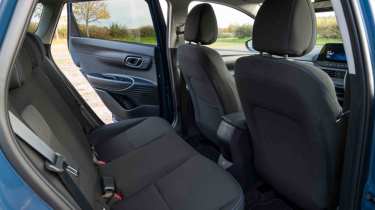
Boot space
There’s 411 litres of boot space available in all versions of the Bayon, and that expands to 1,205 litres with the rear seats folded using the standard 60:40-split rear bench. That’s pretty good for a small SUV, although the similarly sized Ford Puma has a more generous 456-litre boot, while the cheaper mild-hybrid Dacia Duster offers up even more, with 594 litres.
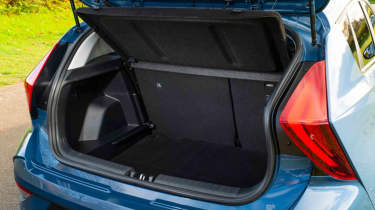
Towing
Buyers looking for a car with good towing ability will probably be drawn to models with a bigger engine and more power and torque than the Bayon. But Hyundai's small SUV has a 1,100kg maximum braked trailer weight, which should be enough for most basic needs.
Expert view, on practicality
“If you need to remove the parcel shelf to load taller items into the boot, the Bayon has a set of runners along the sides of the luggage area that you can slot the parcel shelf into, letting it be tidily stored up against the back seat rest.” – Max Adams, Online reviews editor, who drove a Hyundai Bayon Ultimate over a week-long loan.
Reliability & safety
| Pros |
|
| Cons |
|
The Hyundai brand came in 17th place out of 32 manufacturers in our latest Driver Power customer satisfaction survey, which is a bit behind Nissan (15th), Honda (11th), and stablemate Kia (3rd), but ahead of Dacia (22nd), Renault (28th), and Ford (30th).
Standard safety kit is good, and all versions of the Bayon come with autonomous emergency braking, driver-attention alert, emergency call, hill-start assist, pedestrian detection, lane-keep assist, parking sensors and tyre-pressure monitoring.
Move up to the top-spec Ultimate model (or add the Driving Convenience Pack to an automatic-equipped car with Premium trim) and you also get blind-spot warning along with adaptive cruise control.
It’s fairly easy to switch off some of the more intrusive safety-assistance technology – for instance holding down the lane-keep assistance button until the steering symbol in the instrument cluster goes amber – and you can presave the speed recognition on/off function to the star button on the steering wheel. Both of these can also be turned off while on the move, unlike in the Honda HR-V, where you have to be stationary with the gearbox in ‘Park’.
However, the Bayon received a four-star rating (out of five) from crash test body Euro NCAP, with rear-occupant chest protection rated as weak. For those looking for a small SUV with a five-star rating, consider the SEAT Arona or the Toyota Yaris Cross.
| Key standard safety features |
|
| Euro NCAP safety ratings |
|
Buying and owning
Our best buy: Hyundai Bayon 1.0T Premium DCT auto
Your choice of engine is already taken care of, because there’s only one available, but we’d recommend you choose an automatic Bayon in order to avoid the annoying low-speed driving characteristics of the manual model. We’d also suggest you go for the mid-range Premium trim because it adds some useful features for not much more money.
Hyundai offers an excellent unlimited-mileage five-year warranty on all new cars. You get a year’s worth of breakdown cover and an anti-rust warranty that covers the car for 12 years, too.
The company also offers fixed-price servicing, which will likely cost around £250 for a full service (you’ll have one of these in a three-year ownership) and £150 for a smaller service (in years one and three of a new car ownership period, unless you cover more than 10,000 miles a year).
Hyundai Bayon alternatives
The Hyundai Bayon is a small SUV that takes on the SEAT Arona, Volkswagen T-Cross, Skoda Kamiq and Ford Puma. Those wanting a more entertaining drive will want either the Puma or Arona, while those looking for a more refined package will do better with either the Kamiq or T-Cross.
In our opinion, the best choice is the Dacia Duster, which is more affordable than the Bayon. It also gives you the chance to go for a much more efficient hybrid model, or something with four-wheel drive and some genuine off-road capability. Plus it’s bigger and more practical than the Bayon, making it a better choice for family car buyers.
There are plenty of other rivals as well, including the funky Citroen C3 Aircross, the premium-feeling Peugeot 2008, the versatile Renault Captur, the highly efficient Toyota Yaris Cross, or the varied engine range of the Vauxhall Mokka.
Deals on the Hyundai Bayon and alternatives
Hyundai Bayon pictures
Frequently Asked Questions
The Hyundai Bayon is well suited to its target market, but it doesn’t beat any rival in any particular area to make it a stand-out choice.
